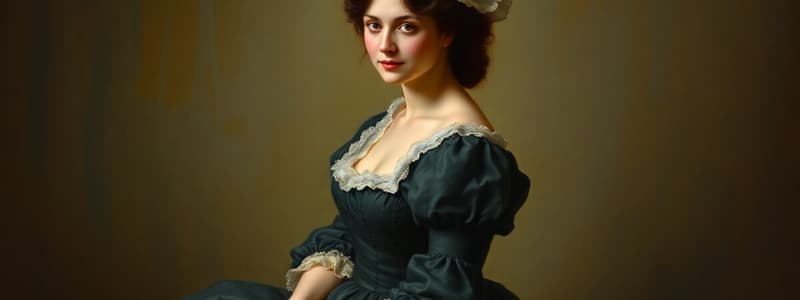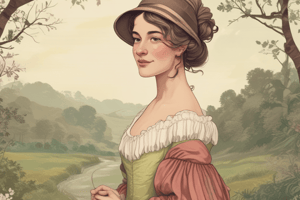Podcast
Questions and Answers
What role does Emma Woodhouse primarily take on in the novel?
What role does Emma Woodhouse primarily take on in the novel?
- A governess for Harriet Smith
- A matchmaker for her friends (correct)
- A romantic interest for Mr. Knightley
- A critic of societal norms
Which character discourages Emma's matchmaking efforts?
Which character discourages Emma's matchmaking efforts?
- Mr. Knightley (correct)
- Mr. Elton
- Mr. Martin
- Harriet Smith
What central theme is explored through Emma's character development?
What central theme is explored through Emma's character development?
- The complexity of friendship
- Political change in England
- The importance of wealth
- Self-awareness and personal growth (correct)
What significant realization does Emma come to by the end of the story?
What significant realization does Emma come to by the end of the story?
Which character does Emma initially set Harriet Smith to pursue?
Which character does Emma initially set Harriet Smith to pursue?
What social class does Harriet Smith belong to?
What social class does Harriet Smith belong to?
Emma believes her friend Harriet deserves a match with which type of individual?
Emma believes her friend Harriet deserves a match with which type of individual?
What does Emma initially think about Mr. Elton's interest?
What does Emma initially think about Mr. Elton's interest?
What impact did the publication of Emma have concerning its cultural significance?
What impact did the publication of Emma have concerning its cultural significance?
Who played the role of Emma Woodhouse in the 2020 film adaptation?
Who played the role of Emma Woodhouse in the 2020 film adaptation?
What causes Emma to ultimately feel remorse about her behavior towards Miss Bates?
What causes Emma to ultimately feel remorse about her behavior towards Miss Bates?
What misconception does Emma hold regarding Frank Churchill's affections?
What misconception does Emma hold regarding Frank Churchill's affections?
What ultimately prompts Emma to realize her own feelings for Mr. Knightley?
What ultimately prompts Emma to realize her own feelings for Mr. Knightley?
How does social class significantly impact relationships in the novel?
How does social class significantly impact relationships in the novel?
What is Emma's view on marriage at the beginning of the novel?
What is Emma's view on marriage at the beginning of the novel?
What significant role do letters play in the novel?
What significant role do letters play in the novel?
What does Mr. Knightley warn Emma about Frank Churchill?
What does Mr. Knightley warn Emma about Frank Churchill?
What does the ending of the novel signify about relationships?
What does the ending of the novel signify about relationships?
How does Emma feel about her matchmaking abilities throughout the novel?
How does Emma feel about her matchmaking abilities throughout the novel?
What ultimately leads to the revelation of Frank and Jane's secret engagement?
What ultimately leads to the revelation of Frank and Jane's secret engagement?
What is a central theme in the story of Emma?
What is a central theme in the story of Emma?
How does Emma's view of her matchmaking abilities change throughout the story?
How does Emma's view of her matchmaking abilities change throughout the story?
What mistaken belief does Emma have regarding Mr. Elton's affections?
What mistaken belief does Emma have regarding Mr. Elton's affections?
Which social custom does Emma's character primarily challenge?
Which social custom does Emma's character primarily challenge?
What results from Emma's matchmaking attempt between Harriet and Mr. Elton?
What results from Emma's matchmaking attempt between Harriet and Mr. Elton?
Which character closely observes Emma's behavior and offers her advice?
Which character closely observes Emma's behavior and offers her advice?
What does Emma initially think about Harriet's suitability for Mr. Martin?
What does Emma initially think about Harriet's suitability for Mr. Martin?
What does Emma resolve to do by the end of the novel regarding matchmaking?
What does Emma resolve to do by the end of the novel regarding matchmaking?
How is the character of Emma Woodhouse described?
How is the character of Emma Woodhouse described?
What element of society does Jane Austen critique through her portrayal of Emma's character?
What element of society does Jane Austen critique through her portrayal of Emma's character?
What does Emma initially suspect about Jane Fairfax's relationship with Mr. Dixon?
What does Emma initially suspect about Jane Fairfax's relationship with Mr. Dixon?
How does Mr. Knightley view Frank Churchill's personality?
How does Mr. Knightley view Frank Churchill's personality?
What triggers Emma's realization of her own feelings for Mr. Knightley?
What triggers Emma's realization of her own feelings for Mr. Knightley?
What significant event prompts the revelation of Frank and Jane's secret engagement?
What significant event prompts the revelation of Frank and Jane's secret engagement?
Which character does Emma believe is a potential match for Harriet?
Which character does Emma believe is a potential match for Harriet?
What aspect of social class is highlighted through Emma's interactions?
What aspect of social class is highlighted through Emma's interactions?
What does Emma regret after Mr. Knightley rebukes her?
What does Emma regret after Mr. Knightley rebukes her?
What ultimately leads to the conclusion of the novel with multiple marriages?
What ultimately leads to the conclusion of the novel with multiple marriages?
What did Emma decide about her own marital status at the beginning of the novel?
What did Emma decide about her own marital status at the beginning of the novel?
What issue does Emma misperceive concerning Harriet Smith’s affections?
What issue does Emma misperceive concerning Harriet Smith’s affections?
What critical flaw does Emma possess that affects her matchmaking intentions?
What critical flaw does Emma possess that affects her matchmaking intentions?
Which aspect of Emma's character is highlighted as a major theme throughout the novel?
Which aspect of Emma's character is highlighted as a major theme throughout the novel?
How is Emma's lifestyle described at the beginning of the novel?
How is Emma's lifestyle described at the beginning of the novel?
What resolution does Emma initially hold regarding her marital status?
What resolution does Emma initially hold regarding her marital status?
How does Emma's upbringing influence her character?
How does Emma's upbringing influence her character?
What does Emma think of her discernment in matchmaking?
What does Emma think of her discernment in matchmaking?
What kind of relationship does Emma maintain with her father?
What kind of relationship does Emma maintain with her father?
Which character primarily influences Emma's growth towards humility and kindness?
Which character primarily influences Emma's growth towards humility and kindness?
Which theme is contradicted by Emma's character development?
Which theme is contradicted by Emma's character development?
What consequence does Emma face due to her misguided perceptions?
What consequence does Emma face due to her misguided perceptions?
Flashcards are hidden until you start studying
Study Notes
Emma Woodhouse
- Emma Woodhouse is the protagonist of Jane Austen's novel “Emma.”
- She is wealthy, beautiful, and lives in the English village of Highbury.
- Believing herself to be a talented matchmaker, Emma attempts to arrange marriages for her friends, including her friend Harriet Smith.
- Emma's matchmaking efforts are often misguided, leading to misunderstandings and hurt feelings.
- Emma's attempts to play matchmaker also blind her to her own feelings for Mr. Knightley.
Key Relationships in Emma
- Mr. Knightley: A long-time friend and brother-in-law of Emma who acts as a mentor and confidant. He is critical of Emma’s matchmaking schemes and often challenges her assumptions.
- Harriet Smith: An orphaned girl who is Emma's friend and whom Emma attempts to "improve." Harriet is naive, but kind and well-meaning.
- Mr. Elton: The local vicar who is initially a candidate for Harriet's hand in marriage in Emma's mind but his intentions are ultimately revealed to have been for Emma herself.
- Jane Fairfax: A young woman who returns to Highbury to visit her aunt and grandmother. Emma is initially jealous of Jane's accomplishments and beauty.
- Frank Churchill: Emma initially finds Frank charming but later realizes that his attentions are superficial. He is secretly engaged to Jane Fairfax.
Social Hierarchy and Class
- The novel explores the social hierarchy of Regency-era England.
- Characters are judged based on their social standing and financial security.
- Emma's attempts to arrange marriages often reflect this hierarchy.
Themes in Emma
- Pride and Vanity: Emma's pride in her abilities as a matchmaker blinds her to her own flaws and leads to problematic decisions.
- Misperception: Emma repeatedly misinterprets social interactions and romantic intentions, which leads to misunderstandings and pain for herself and others.
- Marriage: The novel explores the changing social norms of marriage in the 19th century, including the expectations of women and the pressures to marry for social and financial reasons.
- Personal Growth: Through her experiences, Emma learns to acknowledge her flaws and develop a greater understanding of herself and the people around her.
Emma Woodhouse
- Emma is a young, wealthy, and beautiful woman who lives a comfortable life with her father in Highbury.
- She is known for her intelligence, beauty, and social standing.
- Emma was raised by a governess, Mrs. Weston, who instilled in her some of her own qualities, including a love for matchmaking.
- Emma believes herself to be an excellent matchmaker, but her pride and vanity often lead her to misjudge people and situations.
- Despite her flaws, Emma is kind and ultimately learns from her mistakes, cultivating humility and embracing a more selfless outlook on life.
- Initially, she decides to remain single, valuing her independence and pleasure. She later reverses her decision and marries Mr. Knightley, who is a long-time friend of her family.
Social Class
- Emma's world is steeped in the social hierarchy of 18th-century England.
- The wealthy and well-bred elite hold significant social power, dictating who is invited to gatherings and who is deemed worthy of their company.
- Those in lower social classes rely on the charity and good graces of the upper class.
- Any violation of this social order is met with indignation by those of "genteel-breeding."
Marriage
- Marriage is central to the novel, explored with various perspectives and motivations.
- The ideal marriage often entails a strong match in terms of financial stability, social standing, shared values, and compatibility.
- For women, marriage was particularly crucial as it granted them social standing and financial security in an era where they had limited control over their property and employment opportunities.
Gender Limitations
- The novel highlights the limitations faced by women in Austen's era.
- Emma's choices are often limited to those dictated by society's expectations for women. Even though she is independent and wealthy, her actions are still confined by the social norms of her time.
- She is initially determined to remain single, a bold choice for a woman of her time.
Misperception
- Emma's tendency to misjudge people and situations arises from her pride and vanity. She repeatedly misinterprets the signals of attraction and interest.
- Throughout the novel, Emma makes incorrect assumptions about the feelings of others, such as believing Mr. Elton's interest in Harriet when he is actually in love with her.
- She also mistakes Harriet's love for Mr. Knightley for a fondness for Frank Churchill.
Pride and Vanity
- Emma's pride and vanity are her major character flaws.
- She often overestimates her judgment and sees herself as superior to others.
- Her pride leads her to make poor decisions and hurt those around her.
- Throughout the novel, she is challenged to recognize her own flaws and overcome her vanity.
Studying That Suits You
Use AI to generate personalized quizzes and flashcards to suit your learning preferences.




